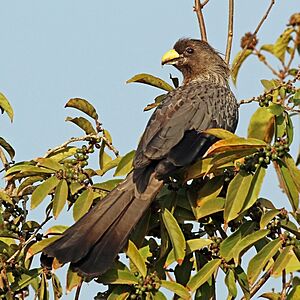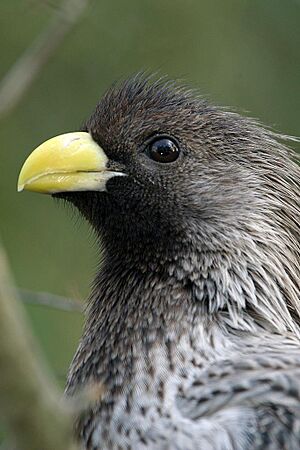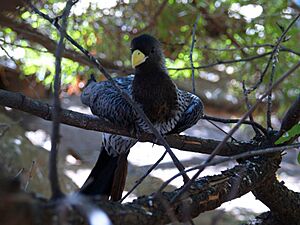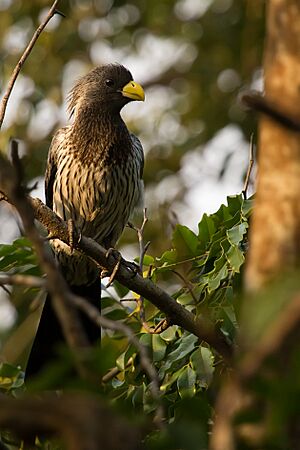Western plantain-eater facts for kids
Quick facts for kids Western plantain-eater |
|
|---|---|
 |
|
| In Gambia | |
| Conservation status | |
| Scientific classification |
|
| Kingdom: | Animalia |
| Phylum: | Chordata |
| Class: | Aves |
| Order: | Musophagiformes |
| Family: | Musophagidae |
| Genus: | Crinifer |
| Species: |
C. piscator
|
| Binomial name | |
| Crinifer piscator (Boddaert, 1783)
|
|
| Script error: The function "autoWithCaption" does not exist. | |
Script error: No such module "Check for conflicting parameters".
The western plantain-eater (Crinifer piscator) is a large bird found only in Africa. It's also known as the gray plantain-eater or western gray plantain-eater. These birds are part of the turaco family, which includes many colorful birds. Western plantain-eaters live in open woodland areas in tropical west Africa. They build nests in trees and lay two or three eggs.
What it Looks Like
These birds are quite common and easy to spot, even though they aren't as brightly colored as some of their relatives. They grow to be about 50 centimeters (20 inches) long, and that includes their long tail!
Their feathers are mostly gray on top, with some brown spots. Their head, neck, and chest are brown with shiny silver streaks. They have a cool crest on their head that they can raise. The feathers on their belly are whitish with lots of brown streaks.
The western plantain-eater has a thick, bright yellow beak. When it flies, you can see a clear white bar on its wings. Male and female birds look very similar. Young birds, however, have a black, fuzzy head and don't have the silver streaks yet.
This bird looks a lot like its close relative, the eastern plantain-eater. But you can tell them apart because the eastern plantain-eater has white bars on its tail. The western plantain-eater also has bars on its chest and dark shafts on its wing feathers, which the eastern one doesn't.
What it Eats
Western plantain-eaters love to eat fruit, especially figs. They also munch on seeds and other plant parts.
Sounds it Makes
If you're in west Africa, you'll often hear the western plantain-eater's loud call. It sounds like "cow-cow-cow!"
Bird Names and History
The western plantain-eater was first described by a French scientist named Georges-Louis Leclerc, Comte de Buffon in 1770. He saw a bird from Senegal. Later, in 1783, a Dutch naturalist named Pieter Boddaert gave it the scientific name Falco piscator.
Today, this bird is placed in a group (called a genus) named Crinifer. This name was given by a Polish zoologist, Feliks Paweł Jarocki, in 1821. The name Crinifer comes from Latin words meaning "hair" and "bearing," probably because of their crest. The specific name piscator is Latin for "fisherman."
 | Mary Eliza Mahoney |
 | Susie King Taylor |
 | Ida Gray |
 | Eliza Ann Grier |





